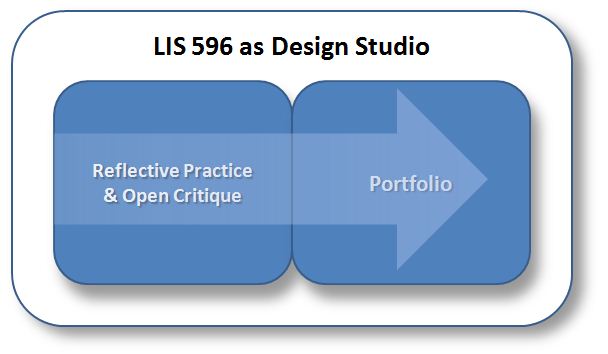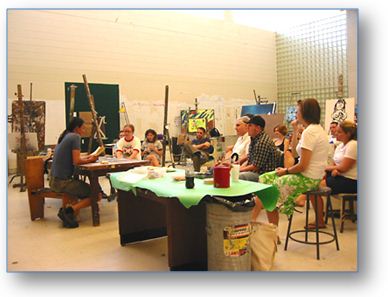General Portfolio Home
Announcements • Portfolio • Overview • Awarding of Credit
“A portfolio is opinion backed by fact....A portfolio tells a story. It is the story of knowing. Knowing about things... Knowing oneself... Knowing an audience...Portfolios are students' own stories of what they know, why they believe they know it, and why others should be of the same opinion.” —(Paulson & Paulson, 1991, p.2)
Portfolio is derived from the Latin 'portare', ('to carry'/movable) and folium ('document'/artifact).
Definitions
- An artifact in the context of the portfolio is any resource (any digital or digitized entity) that stands as evidence of the level of professional competence of a professional action on the part of the portfolio owner. An artifact is evidence of: (1) the occurrence of a professional activity; and (2) the professional quality of the outcomes of the activity. Thus, the observer of the artifact should be able to state: "This artifact created by John Doe represents competent professional work."
- An artifact reflection in a professional portfolio is a "rhetorical device"—a form of argument/persuasion/proof intended to get the reader to "see" the artifact in the manner intended by the author of the reflection. The reflection's role (and the author's intent) is to inexorably lead the reader to see the artifact in light of the professional attainments it evidences. In other words, the reflection demonstrates clearly why the artifact was included in the portfolio and how it illustrates your professional achievements and competencies.
Portfolio
In the context of LIS 596: Professional Portfolio, there are three distinct forms of portfolio that touch on the work of the class:
- Assessment Portfolio: In the assessment portfolio, students demonstrate knowledge and skill in relation to specific outcomes defined by professional organizations relevant to the student's career goals. The expectations of a professional organizations take the form of practice standards—i.e., statements of competency that define forms and levels of knowledge, skills and habits of mind possessed by competent professionals.
- Digital Repository (Working Portfolio): The working portfolio is a digital repository of evidence collected over time of relevant professional-level experiences. Evidence is shown through artifacts and accompanying reflections on those artifacts. The digital repository can include everything from artifacts representing course work to brainstorming activities to drafts to finished products. Students should prepare for their portfolios by collecting all potential artifacts as they move through the program. The collection becomes meaningful when specific artifacts are selected out to focus on particular experiences or goals.
In general, the digital repository is private and intended to serve profession needs through our professional life. It documents the professional's resume over time. Experiences documented in the digital repository become the resources for development of any number of presentation portfolios (see below) that are framed in terms of specific professional objectives—e.g., a specific employment announcement. Thus, resources in the digital repository may be linked out to any number of presentation portfolios over the professional's career. - Presentation Portfolio: Students share exemplary professional-level work in customized portfolios comprised of relevant experiences (artifacts and reflections) targeting specific professional goals—e.g., a specific employment announcement. Some refer to it as a "showcase" portfolio since it showcases professional competence in a given context. Presentation portfolios range in form from the general portfolio that highlights the professionals competencies in a practice niche to a portfolio intended to address the needs of a particular position. Technically, presentation portfolios range from conventional websites managed by the professional to blogs and wikis.
During instruction in LIS 596, students are engaged in activities around all forms of portfolio. We encourage all students to become engaged in the routine activities of building his or her own digital repository to document professional-level activities. Students who intend to use LIS 596 as their required culminating experience are required to develop the digital repository throughout their time in the iSchool.
Students enrolling in LIS 596 must have the digital repository developed and available for use at the beginning of the quarter of enrollment. Detailed information regarding the digital repository is available here.
LIS 596 Course Overview
Like the other MLIS culminating experiences, LIS 596: Professional Portfolio assumes the necessary background stemming from MLIS course work to successfully "culminate" the degree program. Unlike the culminating experiences that focus on research (i.e., INFX 594: Research Project and LIS 700 Master's Thesis), LIS 596: Professional Portfolio focuses on the design of a digital professional portfolio for full or limited publication. In this sense, the course shares a design focus with INFX 595-596: Capstone. Successful completion of LIS 596 hinges on the following:
- Students have prepared for the portfolio by gathering a set of artifacts evidencing professional-level work prior to the start of class. Artifacts should stem from iSchool course work, previous and current employment, directed field work, service contributions, and other relevant sources.
- Students are willing to work with a high level of personal autonomy befitting a nascent professional while actively engaging in the processes of open peer critique in small peer groups and on the class forums. Thus, their success is contingent on the willingness and ability of all students enrolled in the course to engage in constructive peer critique and to respond to constructive criticism of their own portfolio work.

LIS 596 is run as a design studio. Work is critiqued in the "open" through the sharing of your work with peers and course facilitators. The course is not based on traditional graded deliverables developed by the student for sole assessment by the instructor. Facilitators review teh three course deliverables and then inform each student as to whether adequate progress toward credit has been achieved. With the exception of the final portfolio submission, all deliverables are part of the critique process by peers and facilitators. Only facilitators formally critique the final presentation portfolio submission. Since student development hinges as much on constructive critique by peers as by course facilitators, active, timely contributions are required. Late work may result in an assignment of no credit for the course, in which case the course must be repated.
 What is a "design studio"?
What is a "design studio"?
The activity of developing a portfolio is a design activity just as creation of a new information system or service, design of a new thesaurus, or development of an adult reading program are all design activities. Design studio is a method developed through design education and apprenticeship in fields such as theatre arts, information system design, and architecture, where students develop knowledge and skills through "doing" and through respectful criticism of all work as a community of designers.
Therefore, you will: (1) design the portfolio "in the open"; and (2) engage in both structured and unstructured open critiquing activities in which we share the results of our efforts with our peers and grow as a result of their constructive criticism. An important outcome of the course is the students' development as reflective practitioners and planning for future professional development.
 If you are unwilling to engage in the open critique of your professional-level work, we suggest that you pursue one of the alternative culminating experiences that do not require such engagement (i.e., INFX 594: Research Project or LIS 700 Master's Thesis—be alert that both INFX 594 and LIS 700 require prior approval from supervising faculty). If you are unwilling to engage in the open critique of your professional-level work, we suggest that you pursue one of the alternative culminating experiences that do not require such engagement (i.e., INFX 594: Research Project or LIS 700 Master's Thesis—be alert that both INFX 594 and LIS 700 require prior approval from supervising faculty). |
Awarding of Credit for LIS 596
LIS 596: Professional Portfolio is a project-based course and carries a credit/no credit grading designation. With each milestone, students are critiqued in terms of how the work might be improved. They are also be informed whether the facilitators consider the deliverable to represent adequate progress toward earning course credit. To earn credit, a student must complete all course milestones on time and in a professional manner, and at a level of quality befitting a nascent professional. A student with otherwise satisfactory completion of work will not receive credit if any deliverables are missing and may not receive credit for the course if deliverables are late.
Link to evaluative criteria for the portfolio.
Announcements • Portfolio • Overview • Awarding of Credit
Last updated: Thursday, 07-Apr-2011 09:53:36 PDT
© 2006 Information School of the University of Washington
All rights reserved

